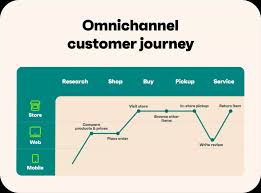Omnichannel Marketing: Creating Seamless Customer Experiences
In today’s digital age, consumers interact with brands through multiple channels, both online and offline. Omnichannel marketing is a strategy that aims to provide a seamless and integrated experience across all these channels, ensuring that customers receive consistent messaging and service regardless of how they engage with the brand.
By adopting an omnichannel approach, businesses can better understand their customers’ behaviour and preferences, allowing them to tailor their marketing efforts to individual needs. This personalised approach not only enhances customer satisfaction but also drives engagement and loyalty.
One key aspect of omnichannel marketing is the use of data analytics to track customer interactions across various touchpoints. By analysing this data, businesses can gain valuable insights into customer behaviour and preferences, enabling them to deliver targeted and relevant content at each stage of the customer journey.
Moreover, omnichannel marketing allows brands to create a consistent brand image and messaging across all platforms. Whether a customer interacts with the brand through social media, email, mobile app, or in-store, they should receive a unified experience that reflects the brand’s values and identity.
Ultimately, omnichannel marketing is about putting the customer at the centre of the strategy and providing them with a seamless and cohesive experience no matter how they choose to engage with the brand. By investing in omnichannel marketing efforts, businesses can build stronger relationships with their customers and drive long-term success in an increasingly competitive marketplace.
Top 5 Frequently Asked Questions About Omnichannel Marketing: Understanding, Implementation, and Benefits
- What is omnichannel marketing and how does it differ from multichannel marketing?
- Why is omnichannel marketing important for businesses in today’s digital landscape?
- How can businesses effectively implement an omnichannel marketing strategy?
- What are the key benefits of adopting an omnichannel approach to marketing?
- How does data analytics play a role in enhancing omnichannel marketing efforts?
What is omnichannel marketing and how does it differ from multichannel marketing?
Omnichannel marketing is a strategic approach that focuses on creating a seamless and integrated experience for customers across all channels, both online and offline. Unlike multichannel marketing, which involves using multiple channels to reach customers but may not necessarily provide a consistent experience across them, omnichannel marketing aims to unify the customer journey by ensuring that messaging, branding, and service are consistent and cohesive regardless of the channel used. In essence, omnichannel marketing recognises the interconnected nature of today’s digital landscape and seeks to provide customers with a holistic and personalised experience that enhances engagement and builds long-term loyalty.
Why is omnichannel marketing important for businesses in today’s digital landscape?
Omnichannel marketing is crucial for businesses in today’s digital landscape because it enables them to meet the evolving needs and expectations of modern consumers. With customers interacting with brands through multiple channels, such as websites, social media, mobile apps, and physical stores, businesses must provide a seamless and integrated experience to stay competitive. By adopting an omnichannel approach, businesses can gain a comprehensive understanding of customer behaviour and preferences, allowing them to deliver personalised and relevant content across all touchpoints. This not only enhances customer satisfaction but also fosters loyalty and drives engagement, ultimately leading to increased sales and long-term success in the digital age.
How can businesses effectively implement an omnichannel marketing strategy?
To effectively implement an omnichannel marketing strategy, businesses need to start by gaining a deep understanding of their target audience and their preferred communication channels. By identifying where their customers are most active, businesses can tailor their messaging and content to suit each platform while maintaining a consistent brand voice and identity. Investing in robust data analytics tools is crucial to track customer interactions across different channels, allowing businesses to personalise their marketing efforts based on individual preferences. Seamless integration between online and offline touchpoints is also essential to ensure a cohesive customer experience. Regularly monitoring and adjusting the omnichannel strategy based on performance metrics and customer feedback is key to staying relevant and competitive in today’s dynamic market landscape.
What are the key benefits of adopting an omnichannel approach to marketing?
Adopting an omnichannel approach to marketing offers a range of key benefits for businesses looking to enhance their customer engagement and drive growth. By providing a seamless and integrated experience across all channels, businesses can improve customer satisfaction, increase brand loyalty, and drive higher conversion rates. The ability to track customer interactions across multiple touchpoints also allows for more targeted and personalised marketing efforts, leading to improved engagement and retention. Furthermore, by maintaining a consistent brand image and messaging across all platforms, businesses can strengthen their brand identity and build trust with customers. Overall, embracing omnichannel marketing can help businesses stay ahead in today’s competitive landscape by delivering a cohesive and impactful customer experience.
How does data analytics play a role in enhancing omnichannel marketing efforts?
Data analytics plays a crucial role in enhancing omnichannel marketing efforts by providing businesses with valuable insights into customer behaviour and preferences across various channels. By analysing data from different touchpoints, businesses can gain a deeper understanding of how customers interact with their brand, what drives their purchasing decisions, and which channels they prefer. This information enables businesses to create targeted and personalised marketing campaigns that resonate with individual customers, leading to improved engagement, loyalty, and ultimately, higher conversion rates. Data analytics also allows businesses to track the effectiveness of their omnichannel strategies, identify areas for improvement, and make data-driven decisions to optimise their marketing efforts for better results.
